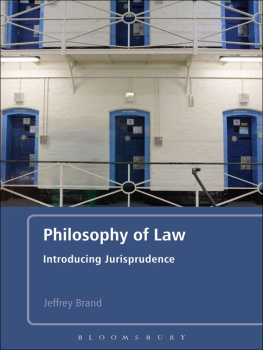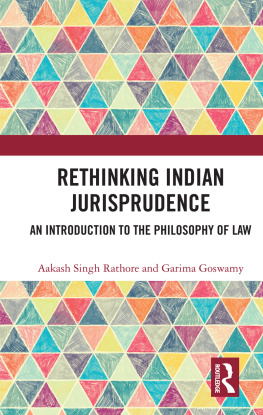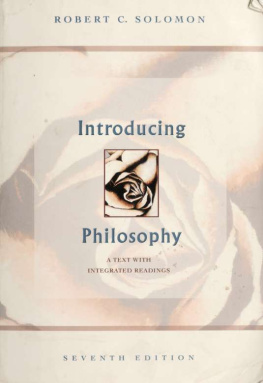Brand - Philosophy of Law: Introducing Jurisprudence
Here you can read online Brand - Philosophy of Law: Introducing Jurisprudence full text of the book (entire story) in english for free. Download pdf and epub, get meaning, cover and reviews about this ebook. year: 2014;2013, publisher: Bloomsbury Publishing, genre: Politics. Description of the work, (preface) as well as reviews are available. Best literature library LitArk.com created for fans of good reading and offers a wide selection of genres:
Romance novel
Science fiction
Adventure
Detective
Science
History
Home and family
Prose
Art
Politics
Computer
Non-fiction
Religion
Business
Children
Humor
Choose a favorite category and find really read worthwhile books. Enjoy immersion in the world of imagination, feel the emotions of the characters or learn something new for yourself, make an fascinating discovery.
Philosophy of Law: Introducing Jurisprudence: summary, description and annotation
We offer to read an annotation, description, summary or preface (depends on what the author of the book "Philosophy of Law: Introducing Jurisprudence" wrote himself). If you haven't found the necessary information about the book — write in the comments, we will try to find it.
Brand: author's other books
Who wrote Philosophy of Law: Introducing Jurisprudence? Find out the surname, the name of the author of the book and a list of all author's works by series.
Philosophy of Law: Introducing Jurisprudence — read online for free the complete book (whole text) full work
Below is the text of the book, divided by pages. System saving the place of the last page read, allows you to conveniently read the book "Philosophy of Law: Introducing Jurisprudence" online for free, without having to search again every time where you left off. Put a bookmark, and you can go to the page where you finished reading at any time.
Font size:
Interval:
Bookmark:
Philosophy of Law
Praise forPhilosophy of Law: Introducing Jurisprudence:
Philosophy of Law: Introducing Jurisprudence is an exceptionally clear, comprehensive, and engaging introduction to philosophy of law. Brand succeeds at doing justice to the complexity of the subject matter while making it accessible. It will be an excellent resource for undergraduate and law school courses in legal philosophy.
John Oberdiek, Professor of Law,
Rutgers University School of Law, USA
Philosophy of Law is a well-written guide to the important ideas and figures providing students with a clear guide to complex material in a useful companion to any legal philosophy course or module.
Thom Brooks, Reader in Law, University of Durham, UK
Jeffrey Brands Philosophy of Law: Introducing Jurisprudence is a highly accessible, highly engaging, and at the same time fundamentally fair-minded, introduction to a wide-range of legal issues that are at the core of contemporary legal education and practice. It would be an excellent resource for an undergraduate survey course in law, whether as a primary text or secondary text to accompany other primary materials.
Alec Walen, Associate Professor of Law, Rutgers University School of Law, USA
Jeffrey Brand has managed to write the best introduction to legal philosophy yet available. The book is sophisticated yet accessible, and the range of issues covered is impressive. Those who read the book will not only learn about legal philosophys main questions and the position of some of its major figures, but will actually learn how to do legal philosophy by observing the manner in which Brand meticulously crafts arguments and counter-arguments for the competing views. If you are looking for one book to adopt in class, then this is the one, and I certainly plan to use it with my students in Brazil.
Noel Struchiner, Professor of Law and Philosophy at the Pontifical Catholic University of Rio de Janeiro, Brazil
Pitched at just the right level to be both accessible and illuminating, master teacher Jeffrey Brand takes the reader on a sure-footed tour of contemporary legal philosophy. Written with the student in mind, it is packed with examples and applications that make clear the importance of the issues it studies. An additional strength is the attention Brand gives to topics that other textbooks tend to shortchange, such as private law, international law, and the ideal of rule of law itself. Highly recommended.
Craig Duncan, Associate Professor and Chair of the Department of Philosophy and Religion, Ithaca College, USA
Brand offers an exceptionally clear presentation of an almost encyclopedic list of topics addressed by analytic legal philosophers. These include not only questions concerning law per se e.g. its nature, the source of its normativity, and its interpretation - but also questions specific to particular areas of law such as criminal law, property and torts, and international law. The organization of the book allows instructors a great deal of flexibility in what they wish to cover, in what order, and in what depth, and enables them to select among the many different connections they might wish to draw between various concepts and arguments. Brand presents students with just the right amount of material on a given topic to spur productive classroom discussion and essays. Reading this book will surely awaken in many students the same passion for doing legal philosophy Brand clearly enjoys.
David Lefkowitz, Associate Professor of Philosophy, University of Richmond, USA
Jeffrey Brand is a highly original and astute legal philosopher. Teachers seeking a clear and comprehensive introduction to the subject, aimed at undergraduate students, will not easily find a better book than this.
Jeffrey Goldsworthy, President of the Australian Society of Legal Philosophy and Professor of Law, Monash University, Australia
Also available from Bloomsbury
Anatomy of Failure, Oliver Feltham
Introduction to Political Philosophy, Alexander Moseley
Law: Key Concepts in Philosophy, David Ingram
Philosophy
of Law
Introducing
Jurisprudence
Jeffrey Brand
Online resources to accompany this book are available at: www.bloomsbury.com/ philosophy-of-law-9781441141897.
Please type the URL into your web browser and follow the instructions to access the Companion Website.
If you experience any problems, please contact Bloomsbury at:

Contents
This book provides a general introduction to the philosophy of law, aiming for breadth rather than depth. The subject as I conceive it goes by many names, including jurisprudence, legal theory, and legal philosophy (which I prefer). We can divide legal philosophy into three main divisions: analytical jurisprudence, descriptive jurisprudence, and normative jurisprudence.
Analytical jurisprudence studies the nature of law (what makes something law and not something else?) and the implications of law (what necessarily follows from the fact that something is law?). Philosophers call these conceptual and metaphysical questions.
Descriptive jurisprudence examines actual laws and legal systems and offers general accounts of them. For example, a scholar might examine the Japanese law of inheritance and try to determine what general values, ideas, and principles it reflects.
Normative jurisprudence concerns what the content of the law ought to be, from the perspective of a conscientious lawmaker. What makes a law good and just? Normative jurisprudence evaluates existing laws and prescribes revisions.
Legal philosophy is somewhat peripheral to the field of philosophy as a whole, but it is extraordinarily broad, nevertheless. I have had to make difficult decisions about what to include in this short book. I have chosen to concentrate on topics that occupy two, interrelated groups of scholars: (1) professional analytical philosophers who write about law; and (2) legal scholars who study these philosophers and are studied by them. Giving the book this focus aligns it with what is widely considered the mainstream of legal philosophy in the English-speaking world.
Within this set of topics, I emphasize those that are accessible to undergraduates and least likely to be covered in other philosophy courses (e.g. applied ethics, political philosophy, feminist philosophy) or elsewhere in undergraduate curricula, in the other humanities or social sciences. I also give preference to topics encountered by law students and topics that interest law professors, as opposed to historians, social scientists, or philosophers whose primary specialization is not legal philosophy. For example, I include sections on the philosophy of private law (tort, contract, property), which is foundational for law students and which undergraduates rarely encounter in other courses.
Philosophers will quickly recognize this book as emerging from the analytical tradition rather than the continental European tradition of Hegel, Marx, Heidegger, Merleau-Ponty, Sartre, Foucault, and Derrida. Some legal philosophers writing in English draw from the continental tradition. They ask some of the same questions posed in this book, although most of their questions are quite different. There has been little interaction, unfortunately, between continental legal philosophers and the core group of scholars defined above. Someone should write a good, English-language introduction to continental legal philosophy.
Next pageFont size:
Interval:
Bookmark:
Similar books «Philosophy of Law: Introducing Jurisprudence»
Look at similar books to Philosophy of Law: Introducing Jurisprudence. We have selected literature similar in name and meaning in the hope of providing readers with more options to find new, interesting, not yet read works.
Discussion, reviews of the book Philosophy of Law: Introducing Jurisprudence and just readers' own opinions. Leave your comments, write what you think about the work, its meaning or the main characters. Specify what exactly you liked and what you didn't like, and why you think so.

















